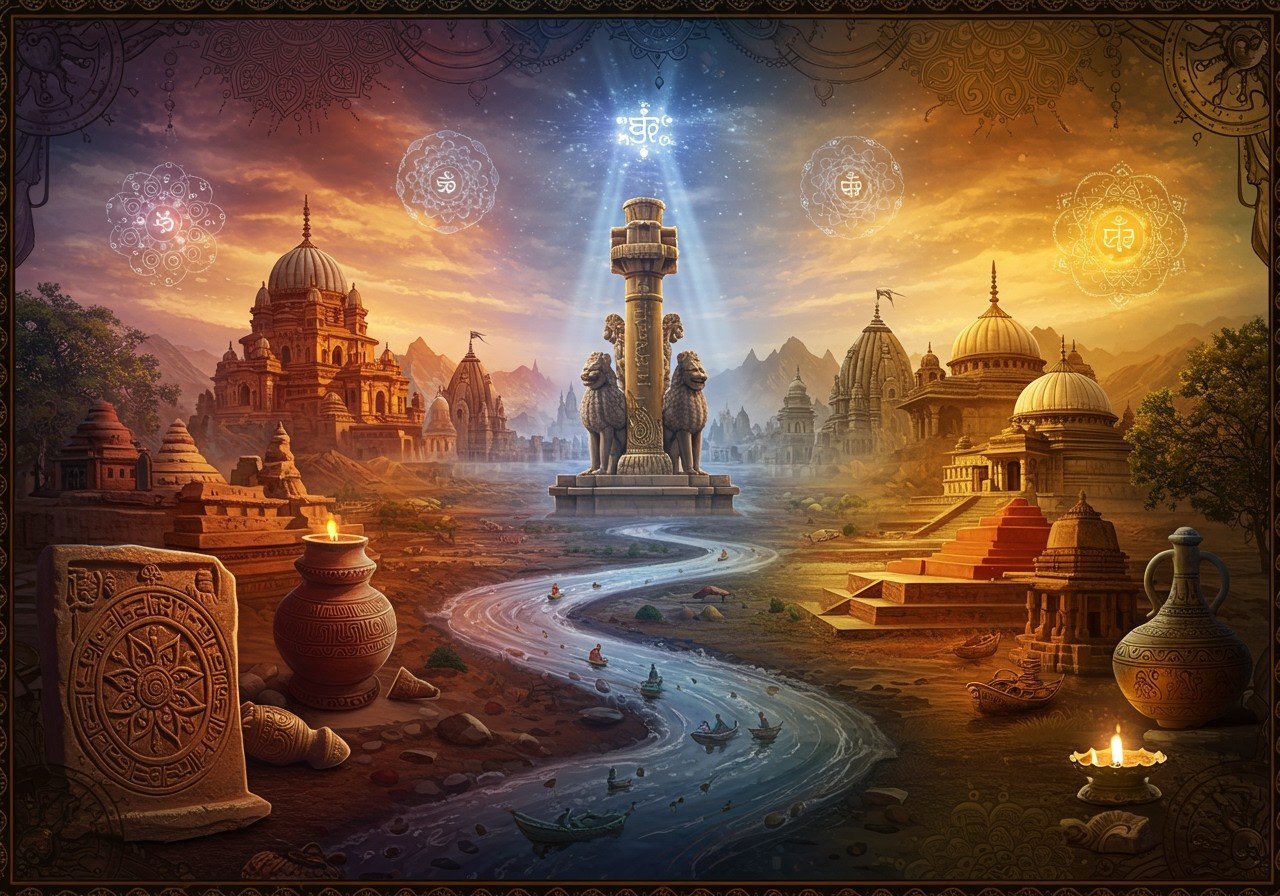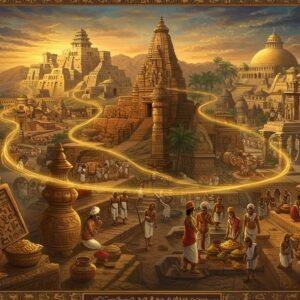
India’s origins and identity are deeply rooted in its rich and complex history. Understanding this history is essential for those who value tradition and authenticity. This exploration delves into the etymology of India’s name, the journey to independence, the formation of modern India, its vibrant cultural heritage, and its economic and political evolution.
The Etymology of India’s Name
The name “India” has a captivating history. Derived from the River Indus (Sindhu), the name evolved through Greek and Persian influences. Ancient Sanskrit texts, such as the Rigveda, mention the Indus Valley, highlighting its historical significance. The term “Bharat,” also used to denote India, reflects the nation’s diverse cultural heritage. Over centuries, various cultural and linguistic influences, including the impact of the colonial era, shaped the name into its current form. Regional names further contribute to the intricate tapestry of India’s identity.
Journey to Independence
India’s journey to independence in 1947 was a pivotal period marked by significant events. British colonial rule, which began with the East India Company in the 17th century, eventually gave way to the rise of Indian nationalism. Key figures like Mahatma Gandhi and Jawaharlal Nehru led the struggle for freedom. The Sepoy Mutiny of 1857, the Partition of Bengal, and the Civil Disobedience Movement are crucial milestones in this journey. Non-violent resistance, exemplified by the Quit India Movement, played a crucial role. The impact of World War II and subsequent negotiations led to the partition of India and Pakistan, shaping the identity of modern India.
Formation of Modern India
Post-independence, India embarked on a path of nation-building. The adoption of the Indian Constitution in 1950 established a framework for governance. The reorganization of states based on linguistic lines had a profound impact on national unity. Economic policies transitioned from a colonial model to a mixed economy. The Green Revolution, industrialization, and the economic liberalization of the 1990s significantly shaped the nation’s economic trajectory. Integrating diverse cultural and ethnic groups presented ongoing challenges, while India’s foreign policy evolved as the nation found its place on the global stage.
Cultural Heritage and Identity
India’s cultural heritage is a vibrant tapestry woven from ancient civilizations like the Indus Valley and the Vedic period. The contributions of dynasties such as the Mauryas, Guptas, and Mughals are integral to this heritage. Religion plays a significant role, with Hinduism, Buddhism, Jainism, Sikhism, and Islam shaping India’s identity. Literature, art, and architecture have all made profound contributions to India’s cultural landscape. Traditional festivals and rituals continue to be observed, preserving cultural heritage and adding to the richness of India’s national identity. This rich heritage remains highly relevant for middle to upper-middle-class Indians today.
Economic and Political Evolution
India’s economic and political evolution since independence is remarkable. From an initial focus on self-reliance and state-led development, the nation underwent significant transformations. The Green Revolution boosted agricultural productivity and spurred rural development. The liberalization policies of the 1990s ushered in an era of economic growth and globalization. Technological advancements and innovation have further modernized India’s economy. Democratic institutions have evolved, shaping the landscape of governance, and contributions from key political figures have shaped India’s development. Contemporary challenges and opportunities continue to influence India’s economic and political trajectory.
Embracing India’s Spiritual Heritage with Poojn.in
Poojn.in is proud to support the preservation and practice of India’s rich spiritual heritage by offering a wide selection of authentic puja items and ritual supplies. Whether you are seeking to enhance your home temple or deepen your spiritual practice, Poojn.in provides high-quality products to enrich your connection with tradition.
For those seeking to connect with Lord Ganesha, remover of obstacles and embodiment of wisdom, we offer a curated selection:
- Pure copper and brass Ganesha idols for home temples: Beautifully crafted idols to create a sacred focal point for your devotions.
- Traditional modak molds for preparing prasad: Prepare delicious offerings with ease and reverence, enhancing your connection with the divine.
- Complete Ganesha puja sets with all essential items: Simplify your puja preparations with comprehensive sets containing everything you need.
- Authentic sindoor and kumkum for ritual offerings: Enhance the sanctity of your rituals with pure and traditional ingredients.
- Sacred thread and cotton wicks for aarti: Elevate your aarti ceremony with high-quality materials that symbolize purity and devotion. Our sacred threads and cotton wicks are carefully selected for their quality and authenticity.
- Pure ghee diya lamps for worship: Illuminate your home temple with the warm glow of pure ghee diyas, creating an atmosphere of reverence and devotion. Our diya lamps are crafted with care and designed for optimal performance.
Poojn.in is committed to providing high-quality, authentic puja items that support your spiritual journey. Explore our collection today and discover the perfect tools to deepen your connection with India’s rich traditions.
Exploring Related Temples and Sacred Sites:
- Bhoganandishwara Temple: Weddings, Tradition, Serenity, and History
- Yameshwar Temples in India: Significance and History
- Upper Bagh Devi Temple: Exploring the Divine Feminine and Goddess Significance


